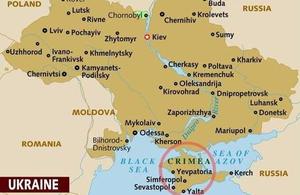Remember Crimea
Her Majesty's Ambassador in Uzbekistan Mr George Edgar writes about Russia's annexation of Crimea that took place one year ago.

Ukraine map before annexation of Crimea
In the article below Her Majesty’s Ambassador in Uzbekistan Mr George Edgar writes about Russia’s annexation of Crimea that took place one year ago.
A year ago, the Kremlin helped stage an illegal and illegitimate “referendum” in Crimea that culminated in Russia annexing Crimea from Ukraine, redrawing the map of Europe by force, and deepening the burgeoning crisis in east Ukraine.
The so-called referendum, hastily prepared in just two weeks, was a mockery of democracy. There were no independent, international monitors. Instead Russian troops enforced President Putin’s will on the ground. We should not be under any illusions about the origin of these fighters. Their kit, their accents and their training all showed them to be Russian, even if their identifying insignia had been stripped.
In the run up to the so-called referendum, Ukrainian terrestrial television stations were shut off in Crimea and anyone who spoke out against Russia’s military occupation faced intimidation and threats. Since then, several have disappeared and others have been found dead, one showing signs of torture.
All of this was done under the false claim from the Russian leadership that the rights of Russian-speakers in Crimea were under threat from Kyiv. This cynical ploy bore no credence whatsoever.
In fact, just last week Vladimir Putin admitted in an interview that he planned the annexation of Crimea weeks before the sham referendum took place. All the while, he was telling the international community that he was not considering the possibility of Crimea joining Russia and denying the presence of Russian troops.
We know that there was never any threat to Russian speakers in Crimea or any other part of Ukraine. Shortly before the annexation, the OSCE High Commissioner for National Minorities said there was “no evidence of any violence or threats”.
In reality, reports by the United Nations, the Office for the High Commissioner for Human Rights and the Council of Europe’s Commissioner for Human Rights have made clear that it was only after Russian occupation that human rights came under threat in Crimea. The effects have been especially felt by Crimea’s ethnic minorities such as the sizeable Crimean Tatar community.
It is vital that the significance of Crimea’s annexation is not downplayed. By annexing Ukraine’s land, violating its territorial integrity, and destabilising east Ukraine with a steady supply of troops and weaponry Russia has challenged the 21st century democratic order and ripped up the international rulebook.
These actions are a flagrant violation of a number of Russia’s international commitments, including under the UN Charter, the OSCE Helsinki Final Act and the 1997 Partition Treaty on the Status and Conditions of the Black Sea Fleet with Ukraine. This is why Russia has been isolated in the Security Council and in the wider international community.
We must not accept Russia’s illegal annexation of Crimea as a new reality. The facts remain that this was an illegal act, Crimea remains occupied and its most vulnerable citizens are bearing the brunt of Russia’s illiberal policies.
The sad reality is that if Russia had not occupied Crimea last year and forced its people to vote at the point of a gun, people in Crimea would today be going about their business peacefully, as for the last 23 years, without the intimidation, hardship and physical danger that comes with illegal Russian annexation.
There is a way out of this situation. Russia can still withdraw its troops from Crimea and eastern Ukraine, abide by its commitments under the Minsk agreements and let the Ukrainian people get on with running their own country.
But until this happens, we will not ignore what has taken place in Crimea. Our established position is firm – Crimea’s annexation is unacceptable, and we will continue to defend our values with sanctions that punish those responsible for taking Crimea from Ukraine.